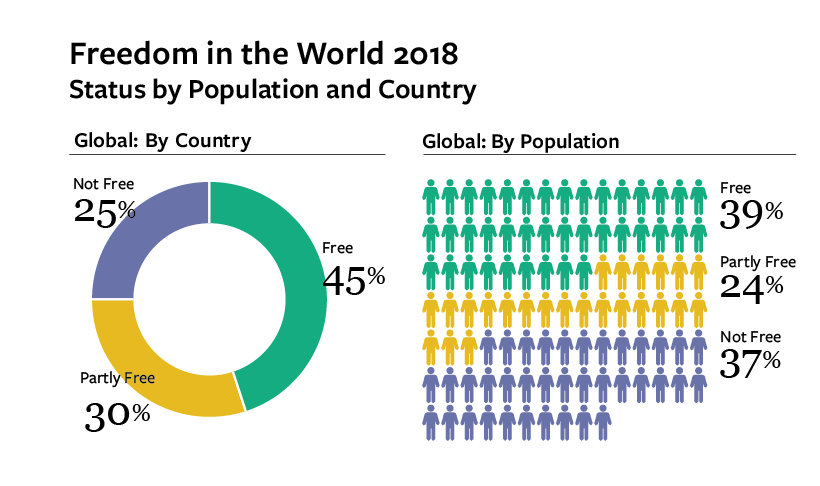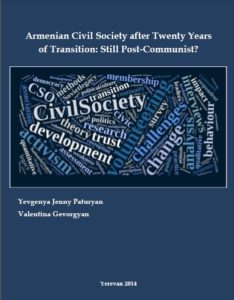 Armenia’s “velvet revolution” is one of the “positive breakthroughs” of the last year to confirm w that “democracy has enduring appeal as a means of holding leaders accountable and creating the conditions for a better life,” said Freedom House.
Armenia’s “velvet revolution” is one of the “positive breakthroughs” of the last year to confirm w that “democracy has enduring appeal as a means of holding leaders accountable and creating the conditions for a better life,” said Freedom House.
“Entrenched elites in many Eurasian countries continued exploiting the advantages of incumbency to maintain their grip on power,” said the group’s Freedom In the World 2019 report. “However, Armenia broke that pattern with the ouster of an unpopular leader and the election of a new, reform-minded government.”
“In the spring of 2018, Armenians took to the streets in protest of an attempt by Serzh Sarkisian to extend his rule by shifting from the presidency to the prime minister’s office,” it added. “To widespread surprise, the protests culminated in Sarkisian’s resignation and the rise of opposition leader Nikol Pashinyan to the premiership. Pashinyan’s My Step alliance decisively won snap parliamentary elections in December, clearing the way for systemic reforms.”
 U.S. foreign assistance to Armenia has not fully diversified to meet the multiple demands of working with postrevolution authorities, although not for lack of effort, says analyst Ray Salvatore Jennings. This leaves a serious gap during what will likely be a difficult year ahead. During this window of vulnerability, progress will be needed in several areas, he writes for Carnegie Europe:
U.S. foreign assistance to Armenia has not fully diversified to meet the multiple demands of working with postrevolution authorities, although not for lack of effort, says analyst Ray Salvatore Jennings. This leaves a serious gap during what will likely be a difficult year ahead. During this window of vulnerability, progress will be needed in several areas, he writes for Carnegie Europe:
- First, Pashinyan’s advisory circle will need targeted technical assistance in strategic communications, task management, and process mapping of key government initiatives. Additional technical assistance should be offered to incoming parliamentarians who lack political experience as well as the country’s ministries of justice, finance, economic development, labor, and territorial affairs. …
- Second, the Armenian government will benefit from tangible, quick wins that signal progress in small but important ways. Examples of such projects include improved trash collection in Yerevan (a chronic complaint), marketplace development, enhanced green spaces, youth-inspired and -produced media content, investigative journalism programming, and the creation of recreation facilities as well as expanded, one-stop-shop administrative centers throughout the country to facilitate government-citizen interaction on reform initiatives. …
 Third, transitional justice mechanisms similar to truth commissions in other contexts should be considered for Armenia. These powerful accountability and transparency tools often play a crucial role in satisfying citizens’ needs for both justice and closure on long-running grievances against unaccountable elites. These processes may also help deter prosecutorial overreach and crusades against political rivals, something that Pashinyan’s anticorruption campaigners have been charged with leading.
Third, transitional justice mechanisms similar to truth commissions in other contexts should be considered for Armenia. These powerful accountability and transparency tools often play a crucial role in satisfying citizens’ needs for both justice and closure on long-running grievances against unaccountable elites. These processes may also help deter prosecutorial overreach and crusades against political rivals, something that Pashinyan’s anticorruption campaigners have been charged with leading.- Fourth, the U.S. government should consider working with Armenian diaspora groups in the United States, especially those that have worked for years to train and prepare residents of the country in public policy and business management. Many of these groups have high-level backers in Congress and are well-placed to ensure diaspora resources are coordinated and leveraged in ways that support the transition.
- Fifth, Armenian counterparts require support for domestic and comparative research as well as collaborative connections with centers of excellence abroad to develop an evidence base for key reform decisions. Armenians have little hard, reliable data to inform the conceptualization, prioritization, and substance of reforms. An expanded evidence base will be especially important for justice and tax reform, anticorruption efforts, and forensic measures to recover stolen funds.
 Sixth, the new government will likely face an escalation in disinformation flows in the months ahead. This threat will be designed to discredit key government figures, disrupt sociopolitical stability, and undermine the reform process. Support is needed to strengthen local capacities to trace the origins of this content and to measure and counter its influence, as effectively modeled in Latvia, Lithuania, and Estonia in their efforts to detect and defend against malign disinformation campaigns directed by the Kremlin.
Sixth, the new government will likely face an escalation in disinformation flows in the months ahead. This threat will be designed to discredit key government figures, disrupt sociopolitical stability, and undermine the reform process. Support is needed to strengthen local capacities to trace the origins of this content and to measure and counter its influence, as effectively modeled in Latvia, Lithuania, and Estonia in their efforts to detect and defend against malign disinformation campaigns directed by the Kremlin.- Finally, support for long-term, slow-to-deliver reforms should move in parallel with the short-term activities described above. Effective near-term programs will preserve an opening for continued engagement, but democratic gains cannot be consolidated and institutionalized without long-term commitments to support civil service and security sector reforms, economic development initiatives, an independent energy policy, and capacity-building initiatives with civic and media actors.
The National Endowment for Democracy’s investments in Armenia for democracy development should be increased and coupled with innovative exchanges like the International Visitors Leadership Program, the Open Society Policy Center’s Alex T. Johnson wrote for The Hill.







